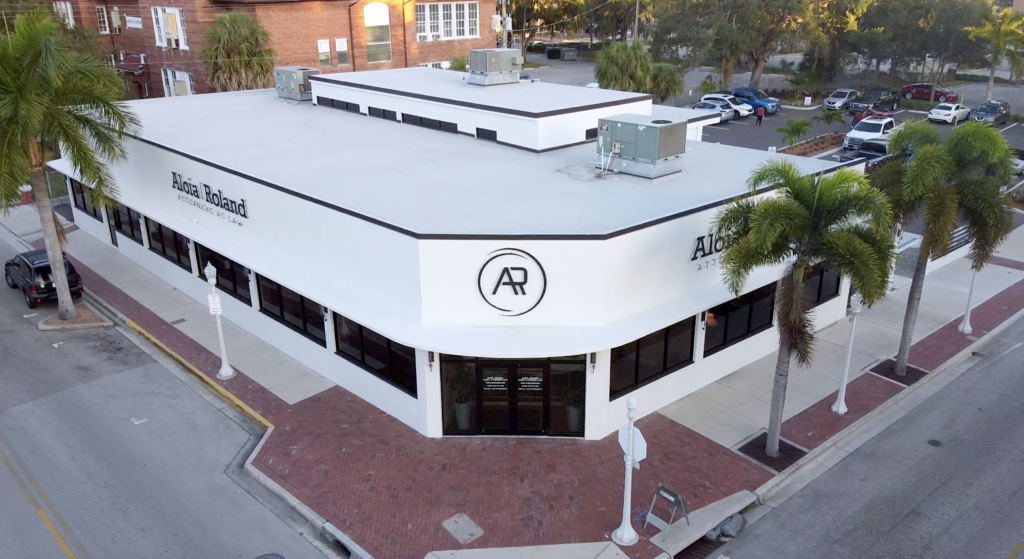At the start of 2019, Aloia, Roland, Lubell & Morgan had ambitious plans for the year ahead. Our 15-year-old law firm was in the process of transforming the historic Fohl’s Hardware store, located at 2222 Second Street in downtown Fort Myers, into our shining new base of operations.
 At the same time, we partnered with SHEEHY strategies who challenged us to rethink our identity entirely. One of the first items of business was to introduce the brand name, Aloia Roland. Our official company name would stay the same. The four senior partners Frank J. Aloia, Jr., Ty G. Roland, Evan D. Lubell and Jack C. Morgan, III would remain our fearless leaders. We merely reached a place in our firm’s history where introducing Aloia Roland allows the firm to expand and opens the door to new opportunities.
At the same time, we partnered with SHEEHY strategies who challenged us to rethink our identity entirely. One of the first items of business was to introduce the brand name, Aloia Roland. Our official company name would stay the same. The four senior partners Frank J. Aloia, Jr., Ty G. Roland, Evan D. Lubell and Jack C. Morgan, III would remain our fearless leaders. We merely reached a place in our firm’s history where introducing Aloia Roland allows the firm to expand and opens the door to new opportunities.
 As a team, we also came to the conclusion that it was time to define our brand in a new way. We realized this process would involve much more than needing a new logo. We discovered we needed to overhaul how we positioned ourselves. We had to evaluate how we appealed to the modern-day client. And we knew developing a new website was an essential undertaking as well.
As a team, we also came to the conclusion that it was time to define our brand in a new way. We realized this process would involve much more than needing a new logo. We discovered we needed to overhaul how we positioned ourselves. We had to evaluate how we appealed to the modern-day client. And we knew developing a new website was an essential undertaking as well.
What we learned through this process was FAR more reflective than we originally assumed. We were asked all sorts of personal questions and our clients, colleagues and family members were interviewed to get to the heart of who we are as individuals.
There were two influences to the inspiration and creative manifestations of the new Aloia Roland brand.
The first form of inspiration was a good ol’ Webster’s Ninth New Collegiate Dictionary with a publish date of 1991.
The second (and most importantly) are the four gentleman who built Aloia, Roland, Lubell & Morgan, PLLC into what it is today — senior partners Frank J. Aloia, Jr., Ty G. Roland, Evan D. Lubell and Jack C. Morgan, III.
Their personal brands were shaped by their expertise, how they serve clients and their distinct personality characteristics. These insights coupled with the exploratory interviews revealed the four parters are the epitome of their practice — so much so that each deserve their own definition!
Using the dictionary as a reference point, there were four obvious parts of speech that stood out as most relevant to the brand: the noun, verb, adverb and adjective.
A noun is a word (other than a pronoun) used to identify any of a class of people, places, or things (common noun), or to name a particular one of these (proper noun).
A verb is a word used to describe an action, state, or occurrence, and forming the main part of the predicate of a sentence, such as hear, become, happen.
An adverb is a word or phrase that modifies or qualifies an adjective, verb, or other adverb or a word group, expressing a relation of place, time, circumstance, manner, cause, degree, etc. (e.g., gently, quite, then, there).
A adjective is a word or phrase naming an attribute, added to or grammatically related to a noun to modify or describe it.
There were key findings with this simple grammar analysis: nouns identify classes (or types); verbs feature action; adverbs qualify the action; adjectives provide description for the classes (or types). These subtleties made a tremendous difference when placing context for the definitions for each of the four partners — especially when evaluating the interconnectedness of Ty and Evan, or Frank and Jack.
One of the main goals of the branding process is to showcase the key differentiators of the senior leadership of Aloia, Roland, Lubell & Morgan. In the next four posts, we’ll introduce each of the four partners, explain their practice area and share how it serves current and future clients.
Read more:


